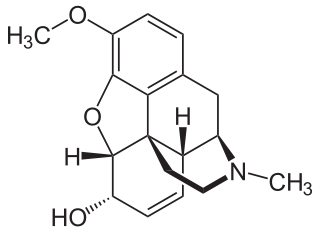Related Research Articles

Infant formula, also called baby formula, simply formula, baby milk or infant milk, is an ultra-processed food designed and marketed for feeding to babies and infants under 12 months of age, usually prepared for bottle-feeding or cup-feeding from powder or liquid. The U.S. Federal Food, Drug, and Cosmetic Act (FFDCA) defines infant formula as "a food which purports to be or is represented for special dietary use solely as a food for infants by reason of its simulation of human milk or its suitability as a complete or partial substitute for human milk".

Tylenol is a brand of medication, advertised for reducing pain, reducing fever, and relieving the symptoms of allergies, cold, cough, headache, and influenza. The active ingredient of its original flagship product is paracetamol, an analgesic and antipyretic. Like the words paracetamol and acetaminophen, the brand name Tylenol is derived from a chemical name for the compound, N-acetyl-para-aminophenol (APAP). The brand name is owned by McNeil Consumer Healthcare, a subsidiary of Kenvue.
Respironics is an American medical supply company owned by Philips that specializes in products that improve respiratory functions. It is based in the Pittsburgh suburb of Murrysville in Pennsylvania, United States.

Johnson & Johnson (J&J) is an American multinational, pharmaceutical, and medical technologies corporation headquartered in New Brunswick, New Jersey, and publicly traded on the New York Stock Exchange. Its common stock is a component of the Dow Jones Industrial Average, and the company is ranked No. 40 on the 2023 Fortune 500 list of the largest United States corporations. In 2023, the company was ranked 40th in the Forbes Global 2000. Johnson & Johnson has a global workforce of approximately 130,000 employees who are led by the company's current chairman and chief executive officer, Joaquin Duato.
The Chicago Tylenol murders were a series of poisoning deaths resulting from drug tampering in the Chicago metropolitan area in 1982. The victims consumed Tylenol-branded acetaminophen capsules that had been laced with potassium cyanide. Seven people died in the original poisonings, and there were several more deaths in subsequent copycat crimes.

Diphenhydramine (DPH) is an antihistamine and sedative mainly used to treat allergies, insomnia, and symptoms of the common cold. It is also less commonly used for tremors in parkinsonism, and nausea. It is taken by mouth, injected into a vein, injected into a muscle, or applied to the skin. Maximal effect is typically around two hours after a dose, and effects can last for up to seven hours.

Cosmetology is the study and application of beauty treatment. Branches of specialty include hairstyling, skin care, cosmetics, manicures/pedicures, non-permanent hair removal such as waxing and sugaring, and permanent hair removal processes such as electrology and intense pulsed light (IPL).

Melamine is an organic compound with the formula C3H6N6. This white solid is a trimer of cyanamide, with a 1,3,5-triazine skeleton. Like cyanamide, it contains 66% nitrogen by mass, and its derivatives have fire-retardant properties due to its release of nitrogen gas when burned or charred. Melamine can be combined with formaldehyde and other agents to produce melamine resins. Such resins are characteristically durable thermosetting plastic used in high pressure decorative laminates such as Formica, melamine dinnerware including cooking utensils, plates, plastic products, laminate flooring, and dry erase boards. Melamine foam is used as insulation, soundproofing material and in polymeric cleaning products, such as Magic Eraser.

Benadryl is a brand of various antihistamine medications used to stop allergies, whose content varies in different countries, but which includes some combination of diphenhydramine, acrivastine, and/or cetirizine.

A product recall is a request from a manufacturer to return a product after the discovery of safety issues or product defects that might endanger the consumer or put the maker/seller at risk of legal action.

Excedrin is an over-the-counter headache pain reliever, typically in the form of tablets or caplets. It contains paracetamol (acetaminophen), aspirin, and caffeine. It was manufactured by Bristol-Myers Squibb until it was purchased by Novartis in July 2005 along with other products from BMS's over-the-counter business. As of March 2015, GSK holds majority ownership of Excedrin through a joint venture transaction with Novartis. On 18 July 2022, GSK spun off its consumer healthcare business to Haleon.

Sibutramine, formerly sold under the brand name Meridia among others, is an appetite suppressant which has been discontinued in many countries. It works as a serotonin–norepinephrine reuptake inhibitor similar to a tricyclic antidepressant. Until 2010, it was widely marketed and prescribed as an adjunct in the treatment of obesity along with diet and exercise. It has been associated with increased cardiovascular diseases and strokes and has been withdrawn from the market in 2010 in several countries and regions including Australia, Canada, China, the European Union, Hong Kong, India, Mexico, New Zealand, the Philippines, Thailand, the United Kingdom, and the United States. However, the drug remains available in some countries.

Rolaids is an American brand of calcium and magnesium-based antacid produced by Chattem. It was invented by American chemist Irvine W. Grote in the late 1920s, and originated with manufacturing in Chattanooga, Tennessee, under one of Chattem's forerunner companies, which manufactured the brand for Warner-Lambert; Warner-Lambert merged with Pfizer in 2000.

In the field of pharmacy, compounding is preparation of custom medications to fit unique needs of patients that cannot be met with mass-produced products. This may be done, for example, to provide medication in a form easier for a given patient to ingest, or to avoid a non-active ingredient a patient is allergic to, or to provide an exact dose that isn't otherwise available. This kind of patient-specific compounding, according to a prescriber's specifications, is referred to as "traditional" compounding. The nature of patient need for such customization can range from absolute necessity to individual optimality to even preference.
McNeil Consumer Healthcare is an American medicals products company belonging to Kenvue consumer health group. It primarily sells fast-moving consumer goods such as over-the-counter drugs.

Codeine is an opiate and prodrug of morphine mainly used to treat pain, coughing, and diarrhea. It is also commonly used as a recreational drug. It is found naturally in the sap of the opium poppy, Papaver somniferum. It is typically used to treat mild to moderate degrees of pain. Greater benefit may occur when combined with paracetamol (acetaminophen) or a nonsteroidal anti-inflammatory drug (NSAID) such as aspirin or ibuprofen. Evidence does not support its use for acute cough suppression in children or adults. In Europe, it is not recommended as a cough medicine in those under 12 years of age. It is generally taken by mouth. It typically starts working after half an hour, with maximum effect at two hours. Its effects last for about four to six hours. Codeine exhibits abuse potential similar to other opioid medications, including a risk of habituation and overdose.
Beginning in March 2007, there was a widespread recall of many brands of cat and dog foods due to contamination with melamine and cyanuric acid. The recalls in North America, Europe, and South Africa came in response to reports of kidney failure in pets. Initially, the recalls were associated with the consumption of mostly wet pet foods made with wheat gluten from a single Chinese company.
In China, the adulteration and contamination of several food and feed ingredients with inexpensive melamine and other compounds, such as cyanuric acid, ammeline and ammelide, are common practice. These adulterants can be used to inflate the apparent protein content of products, so that inexpensive ingredients can pass for more expensive, concentrated proteins. Melamine by itself has not been thought to be very toxic to animals or humans except possibly in very high concentrations, but the combination of melamine and cyanuric acid has been implicated in kidney failure. Reports that cyanuric acid may be an independently and potentially widely used adulterant in China have heightened concerns for both animal and human health.

Robert Lincoln McNeil Jr. was an American chemist and pharmaceutical industry executive. He was responsible for, among other things, the commercial development, naming, and introduction of the pain reliever Tylenol.
References
- 1 2 3 4 "US firm recalls children's drugs". Aljazeera. May 1, 2010. Archived from the original on May 4, 2010. Retrieved May 3, 2010.
- 1 2 Watts, Alex (May 2, 2010). "Warning As Baby Medicines Are Recalled". Sky News. Archived from the original on May 4, 2010. Retrieved May 3, 2010.
- 1 2 3 4 5 6 7 8 9 10 Layton, Lyndsey (May 2, 2010). "Johnson & Johnson division recalls 43 OTC medicines for infants and children". Washington Post. Retrieved May 3, 2010.
- 1 2 3 Singer, Natasha (May 1, 2010). "Children's Tylenol and Other Drugs Recalled". The New York Times. Archived from the original on May 4, 2010. Retrieved May 3, 2010.
- 1 2 3 4 "Panel Investigates J.&J. Recalls". New York Times. Reuters. May 6, 2010. Retrieved May 7, 2010.
- ↑ Parija Kavilanz (May 5, 2010). "Bacteria identified in Tylenol recall". CNN. Archived from the original on May 6, 2010. Retrieved May 7, 2010.
- 1 2 3 4 Rockoff, Jonathan D. (May 2, 2010). "Johnson & Johnson Recalls Children's Medicines". The Wall Street Journal. Archived from the original on May 3, 2010. Retrieved May 3, 2010.
- 1 2 3 "Dozens of children's meds recalled". CBC News. May 1, 2010. Archived from the original on May 3, 2010. Retrieved May 3, 2010.
- ↑ DeNoon, Daniel J. (May 2, 2010). "Recall of Kids' Tylenol, Motrin, Zyrtec, Benadryl". WebMD. Archived from the original on May 3, 2010. Retrieved May 3, 2010.
- ↑ Lactaoen, Derek. "Motrin IB Recalled for Dissolving Issues". ConsumerBell. Archived from the original on July 21, 2012. Retrieved January 17, 2012.